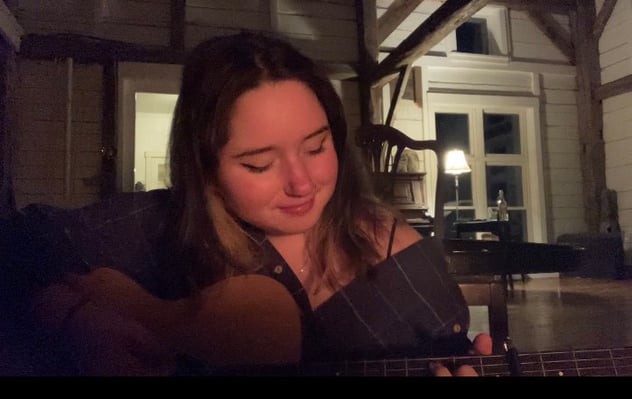Eliza Rhinelander’s (Canada) “8/13/98” joins the ranks of Bob Marley’s “Buffalo Soldier” and “Sunday Bloody Sunday” by U2—powerful songs about historical moments, figures, and events. “This song was actually inspired by an article from the Bay Area Reporter,” she says about the genesis of her song. “On August 13, 1998, for the first time in years, they published no obituaries. It was a sign the AIDS epidemic was finally beginning to wane.” Evoking this moment in history through music, lyrics, and a gorgeous vocal performance resulted in winning Best Lyrics in our Song Writing Competition.
We talk to Eliza about her song writing process, her tonal approach to lyrics, plus her biggest song writing inspiration right now. Read on below!

What was the inspiration for this song and its particular point of view?
This song was actually inspired by an article from the Bay Area Reporter. On August 13, 1998, for the first time in years, they published no obituaries. It was a sign the AIDS epidemic was finally beginning to wane. In the front page article, a man says something along the lines of: “My grandfather knew he was getting to the end of his life when he started scanning the obituary section of the newspaper for his friends’ names. How strange it is that I’m doing the same thing at 30.” That really got to me, and before I knew it, half of the lyrics burst, fully formed, from my head. From that bit of inspiration, I further explored how the AIDS epidemic has affected people. My perspective simultaneously celebrates the hope and gratitude for the medical and social advancements, and the disappointment in the way the epidemic was handled by the government. It’s amazing that we’ve gotten to the point we’re at, but it shouldn’t have taken as long as it did, and if everyone’s life truly were considered equal, it wouldn’t have.
Take us through your songwriting process: how do you go from the see of an idea to performance?
My ideas normally come in tiny pieces, often starting with a little phrase. I word-vomit everything that comes to mind when I think of that phrase, then formulate it into a structure I like (decide the gist of what I want the verses/chorus/bridge to say.) Once I’ve done that, I’ll take inspiration from my word-vomit where I can, and try to find a better, more interesting and thought provoking way to express what I’m trying to say. It’s at this point where I’ll get out my guitar, play some chords, and figure out a rhythm and melody that go with the subject matter of the song. From there, it’s sort of like doing a puzzle, seeing what fits together and what doesn’t.
Our Guest Judge Magou Samb said about your lyrics, “There is a great authenticity in the conversational prose that Eliza adopts in this song.” Do you find that you tend to maintain this conversational style throughout all your songs? Why or why not?
I don’t think all of my songs are as conversational as this one. Different subject matters and perspectives call for different tones. I wanted this song to feel like an old man sitting down in an armchair and telling you his life story, so I tried to use a more casual, conversational tone. More dramatic imagery has its time and its place, and I enjoy using it, but it’s more important to me to think of what serves the song as a whole.
Which songwriter inspires you the most right now?
Oh, hands down Anaïs Mitchell. I wish I could write like her. She’s so, so talented and I’m obsessed! Her songwriting is so smart, she builds these beautiful, big images but grounds them with her effortlessly profound, casual air. She perfectly walks the line between the mundane and extraordinary in a way that I haven’t heard anyone else do quite so adeptly.





